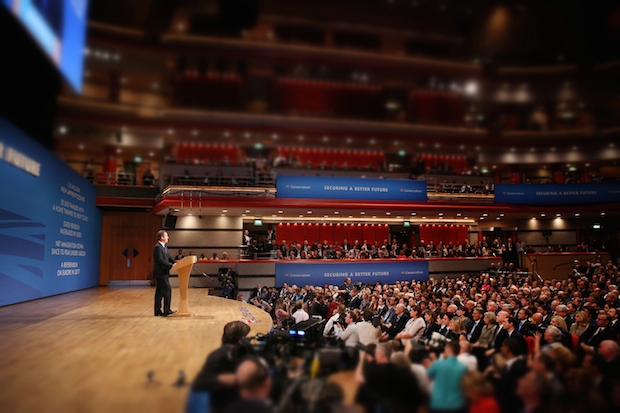Better than Miliband is as fine a demonstration of the soft bigotry of low expectations as you possibly hope to find. Nevertheless, David Cameron’s speech to the Tory conference today was better than Miliband’s chat in Manchester last week. Quite a lot better, in fact. It was almost, gosh, good.
True, it’s not altogether clear how the promised tax cuts – for ordinary and less ordinary hard workers alike – will actually be paid for and, in the context of speech that promised no unfunded tax cuts, this might ordinarily be seen as a small problem. Presumably they will be back-loaded to come into force once the national accounts are balanced in 2018. If they are balanced by 2018, that is. Which they very well might not be.
Still, having been critical of Cameron yesterday it would be churlish to deny the fact that this was not a bad speech at all. Churlish and stubborn and mistaken. I am not sure it will live long in the memory but such is the fate of most conference speeches.
But as a pre-election declaration of intent it sufficed. There were, as was to be expected, imbecilities such as nonsense about the ECHR and the Human Rights Act, some frothing foolishness about freedom of movement within the EU and a hostage to fortune relating to English votes for English laws [sic]. On the whole, however, these blemishes were tangential to the main business of Cameron’s address. He gave the impression he was speaking to more than the Kipperish fringe and for that at least we should be thankful.
The choice at the election is stark: me or the other guy. (Shades of Obama there, by the way). The subtext is clear: Sure, we’ve had our ups and downs and sometimes I’ve disappointed you. It’s not been as easy or as cheery as we’d hoped, has it? But, come on, look at the other guy. Just look at him! I don’t know what you see in him. I don’t believe you know what you see in him. I mean, come on.
It was also a traditional second-term-seeking kind of speech: we’ve done a lot but there’s lots more to do. Give us the tools (a majority!) and we’ll finish the job. Don’t let the other mob ruin all the work we’ve done to this point. Prime Ministers, of whatever party, are always firm believers in the value of sunk costs.
And, look, at least you know what you’re getting with the Tories. Can you really afford to take a risk on Labour? Not just any old Labour party either but Ed Miliband’s very old Labour party?
The speech, however, was a reminder that while Miliband is Labour’s weakest link, Cameron is the Tory’s surest asset. He is better than his party. It’s just that sometimes he seems to forget that. Then again, his party often makes being better than the party easier than it should be.
Even so, the message still isn’t put as clearly as it might be. Take tax, for instance. Raising the personal allowance to £12,500 is a good move. So, frankly, is increasing the threshold above which tax is paid at 40 percent. At present an experienced police sergeant nudges up against the higher tax band. A good number of teachers already pay 40 percent tax on a portion of their earnings. Few people, I think, would reckon these are jobs that merit being taxed so heavily.
Still, Cameron has allowed his opponents to claim that increasing the threshold from £41,000 to £50,000 as another tax cut for the wealthy that must come at the expense of the poor and public services. This was avoidable.
He could have framed it differently. He could have said that if you earn 50% of median wages (currently about £25,000) you won’t pay income tax at all and you won’t pay the higher, 40 percent, rate of income tax until you’re earning more than twice median wages. That’s a better way of putting it, I think, and one that many people, including those earning less than £40,000, might think fair and reasonable. Indeed, the bold move would have been to link both thresholds to median wages, rising each year as (we hope!) median wages increase.
Is that realistic or even plausibly honest? Who knows. Possibly not. Nevertheless, this was a speech that partially made up for what has otherwise been, I think, a dismal and depressing Tory conference. It has given sensible Tories some reason for hope.
He ended – as I guess he had to – with a peroration that suggested the country might be blessed by the hint of an occasional ray of sunshine after all. This was a nod to an earlier, happier, Cameron and, my, was it needed.
The message was simple: winter is with us but spring is coming.







Comments